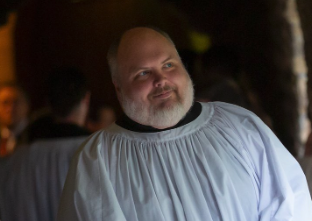A Meditation for Friday after the Third Sunday in Lent:
The Messiah who Perceives our Distress and Comes to Us
By Billy Wint
The Gospel passage for today in the daily lectionary is Mark 6:47-56, the dramatic story of Jesus walking on the sea, coming to his disciples who were fighting against the headwind. The sea represents death and chaos–the chaos monsters of Daniel and Revelation come up out of the sea. The waters of baptism are also the image of death; as the apostle tells us in Romans 6, we are buried with Christ in his death. The sea has a prominent place in Mark; most of Jesus’ ministry takes place alongside or on the sea of Galilee. This is the second of two events in Mark’s gospel that particularly illustrate Jesus’s power over the sea and the forces of death and chaos it represents.
The first event occurs at the end of chapter 4: Jesus tells his disciples in the evening, “Let us go across to the other side,” and they set out to sail across the sea. During the journey a windstorm arose, and the boat was taking on water and in danger of succumbing to the sea. In all this, Jesus was in the stern, asleep. We should be reminded of someone else in Scripture who managed to be fast asleep in the bottom of a boat during a storm that threatened to swamp it: Jonah. In Matthew 12, Jesus identifies himself with Jonah, saying that the only sign that would be given that generation was the sign of Jonah. Jesus was in the bottom of the ship, below the surface of the water, asleep in the sea, the picture of death. Then his disciples call him, and he arises and demonstrates his power over death and chaos by calming the sea. Next, after a period of ministry that culminates with the feeding of the five thousand, Jesus sends his disciples ahead of him and climbs the mountain to pray.
In our reading today, we come to verse 48, “he (Jesus) saw.” Sight is an important theme throughout the book of Mark; the Greek word translated here often refers to perception. Jesus perceives that the disciples are struggling against the wind and are not making progress. It is “about the fourth watch,” so the final watch, just before dawn, when it is the darkest. Jesus comes to them, and, thinking it is a spirit, the disciples cry out in terror. Jesus reassures them that it is him, and as gets into the boat the winds are calmed. The disciples are astounded, and we are told that their astonishment is because of their hardened hearts; they do not understand (do not perceive) what they witnessed in the feeding.
Mark is writing to a people who are about to have to endure very trying times and great persecution for the gospel. He has shown them who Jesus was, that he was the beloved son who was not to be spared. He has shown them that the mission to the Gentiles was Jesus’s intent from the beginning, by emphasizing His ministry on both the Jewish and Gentile sides of the Sea of Galilee. He will show them the journey to Jerusalem, the arrest, condemnation, and crucifixion. Mark will lead his readers to the empty tomb, the declaration by the young man that he is risen and the command to go and tell. However, here at this moment he is telling his readers and us something very important. Where is Jesus now? What is his ministry to the church now that He is resurrected and ascended?
For those of us who through our Baptisms have entered the Ark of the Church and are weathering the forces of chaos and death within it, when the storms come, when hell throws all it can at us, we have comfort in the knowledge that Jesus is on high, interceding for us (Romans 8:34), but we can also rest in the faith that Jesus perceives our distress and comes to us. In our darkest hour, when all seems lost, we will see His dawning to deliver us finally from the onslaught of sin and death. But this is not just a word for the church as a whole, it is also a word for each of us. As we are approaching the fourth Sunday of Lent, the headwinds of our disciplines may be buffeting us, and we may be about ready to throw in the towel. Press on, Jesus perceives your need, and he comes to you in the Sacraments, in the person of the Holy Spirit, in your priest or spiritual director, he comes to still the wind and lead you to your destination. The darkness of the final watch, the difficulty of the struggle only serve to enhance the brightness of the dawning of Christ. Press on, Easter is coming.
After a 25-year career in healthcare, Billy and his wife, Joy, moved from Birmingham, Alabama, to follow his lifelong dream to attend seminary and a not-so-lifelong dream (after converting to Anglicanism at age 22) to become a priest. Billy is in his middler year at Nashotah House, and is from the Diocese of Quincy. The readings for the preceding devotional may be located here from Forward Movement.

